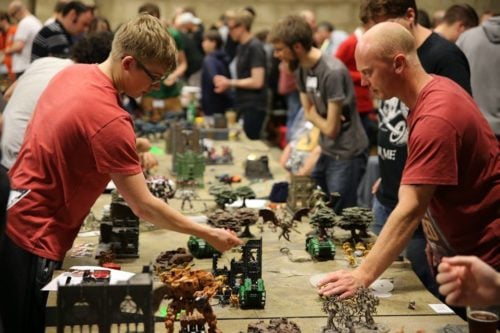40K Tough Love: Competitive Play Vs Growing the Game


I’ve been talking to some big American retailers and a troubling topic has bubbled up. When competitive play wins, the game can lose.
I want to give you guidelines to take you through this conversation and topic.
- I’ve been talking to very large retailers in the US.
- They operate in some of the largest US cities with huge populations.
- The trends they are describing are occurring over a year or more.
So this is by definition, anecdotal, but at the same time, anecdotal over a long period of time, gathered from large groups of gamers being observed. So take all of that into consideration.
The Troubling Topic
I was talking to some retailers who have been wrestling with a thorny subject surrounding 40K. Here’s a set of observations they have been tracking and trying to deal with:
- An FLGS want to run regular events for 40K – to promote the game and grow their playerbase.
- 40K is a mature aged game system that it has a very long history and “institutional memory” among its community compared to other major wargames.
- 40k’s competitive scene is now well developed and has a set of expectations and structures amongst players across the globe.
- When an FLGS is trying to recruit new players into Warhammer 40k, they encounter resistance due to its competitive playerbase, and their expectations of running standardized 40K competitive events.
- This often leads to new players not adopting 40K, and moving into other games such as Age of Sigmar, X-Wing, and others.
- When the FLGS runs “generic 40K events” that are not competitive in nature, the will draw 2-3 times the players to their store compared to 40k competitive events.
- These “generic 40K” events draw a wider range of player experience and armies being played.
- When an FLGS runs 40k competetive events, they will get 1/2 to 1/3 the audience, with a narrower set of “hot meta” lists being played.
- An FLGS does not want to drive off the competitive 40K community, but that community is hesitant to participate in “generic 40K” events.
The Stakeholders
Now let’s talk about the various stakeholders around the game:
- GW: Clearly they want to maximize sales and the growth of their product.
- FLGS: They want to maximize product sales and number of customers.
- Competitive Players: Want to maximize competitive play and number of competitive players/events.
What To Do?
What this conundrum shows is one example of the crosswise priorities and goals of different aspects of our beloved hobby. We all want the game to grow and thrive. The game’s veterans are a valuable part of that community, and can provide a tremendous amount of support and guidance to newcomers. But 40K has a decades old tradition of highly competitive play. Competitive play that still has a lot of baggage from past editions that have no real link to 8th edition. Competitive play that can seem daunting and confusing to new players.
In at least this case, there is a direct negative effect between exposure to the competitive scene and new players. Enough of a conflict that very large FLGS are scratching their heads at how to make it all work together and still grow 40K, rather than throw up their hands and let players move onto other game systems. It’s a sticky situation and one that has no clear solution.
~What’s your take on what’s going on, how would you fix it, and how does this compare with your neck of the woods?




